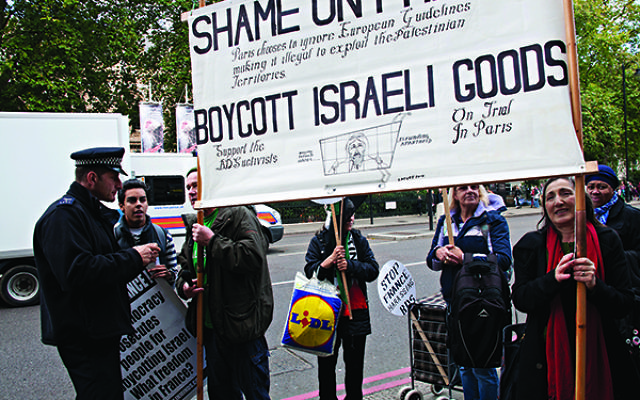Top lawyer warns Gove’s BDS bill has ‘profoundly detrimental impact’ on UK human rights stance
Richard Hermer KC, of Matrix Chambers, concludes the government's bill is 'appallingly badly drafted' and 'effectively equates the OPT (occupied Palestinian territories) with Israel itself'
Lee Harpin is the Jewish News's political editor
MIchael Gove’s attempt to legislate against local authorities and public bodies who engage in boycotts against Israel will have “a profoundly detrimental impact on the United Kingdom’s ability to protect and promote human rights overseas” a top barrister has warned.
Legal advice given to the Labour Party ahead of Monday’s second reading of the Economic Activity of Public Bodies (Overseas Matters) Bill also suggested the proposals were “in certain respects inconsistent with our obligations under international law” and that they “will stifle free speech at home.”
Richard Hermer KC,of Matrix Chambers, also concluded that the bill, as currently drafted, “effectively equates the OPT (occupied Palestinian territories) with Israel itself and is very difficult to reconcile with the long-standing position of the United Kingdom which supports a ‘two-state solution’ based on ‘1967 lines’ in which the security and right to self-determination of both Israelis and Palestinians are protected. ”
The high-profile human rights lawyer added “many of the key provisions of this very poorly drafted Bill are deeply troubling from both a domestic and international law perspective.
He wrote:”The implications for local democracy, for the proud history in our regions of campaigning for global human rights, for using our economic clout for the promotion of human rights, for free speech in this country and for compliance with our international law obligations are potentially profound.”

Hermer noted that his legal opinion was not based around any particular view on the rights or wrongs of BDS. It was shared with Labour’s shadow communities secretary, and other senior party figures, in advance of the bill’s second reading.
In an interview with Jewish News last week Nandy stressed her own, and leader Keir Starmer’s continued opposition to BDS, both currently, and if the party won the next general election.
But Nandy added:”“The bill has been drawn very widely. It gives far-reaching powers to the secretary of state, and has a number of far-reaching implications, none of which appear to have anything to do with tackling BDS, the issue the government says it wants to solve, which we share.”
In a more detailed analysis of Gove’s bill, Hermer concluded that clause 1 of the bill, which seeks to set out the general terms of the prohibition on certain conduct of public bodies has been “appallingly badly drafted.”
He also looked at the clause which attempted to prevent Israel from being singled out for boycotts.
Herner wrote:”The terms of the clause are rendered even more alarming, certainly from a legal and international relations perspective – by the inclusion in Clause 3(7) of the OPT and the Golan Heights in addition to Israel.
“This accords to territories occupied since 1967, (and deemed an unlawful occupation in international law) the precise same specially protected status as Israel itself.
“This effectively equates the OPT with Israel itself and is very difficult to reconcile with the long-standing position of the United Kingdom which supports a ‘two-state solution’ based on ‘1967 lines’ in which the security and right to self-determination of both Israelis and Palestinians are protected. ”
He also suggests: “In my view, legislation prohibiting local authorities from taking steps to promote Palestinian self-determination within the OPT, taken with the terms of the exclusion in Clause 3(7), would likely place the United Kingdom in breach of international law obligations. ”

Hermer also concluded that the move to place power of exemption from the legislation solely in the hands of the secretary of state ” effectively infantilises all other public bodies, many of whom have a long history of using their economic purchasing powers in order to avoid supporting human rights violations and/or to pressurise foreign countries to adopt change.”
In advice that would appear to explain why as many as 50 Tory MPs have voiced opposition to Gove’s bill, Hermer wrote that handing such power to the secretary of state “would seem at odds with the general tenor of government policy to decentralise power. ”
The KC adds “history has shown the capricious consequences that flow when powers of this nature are removed from hundreds of public bodies and placed exclusively in the hands of one decision maker.
“During the apartheid regime local authorities in the UK played a prominent and powerful role in the South Africa boycott campaign. Had this Bill been in force during the 1980s this would have been very likely deemed unlawful and no exemption granted in light of the position of the then Prime Minister that Nelson Mandela was a terrorist and the apartheid regime was an ally. ”
The bill has received strong support from Board of Deputies, as well as from the chair of the Jewish Leadership Council, Keith Black. But other organisations, including Yachad and the human rights charity René Cassin, have raised serious concerns about the proposals.

Many legal experts within the community have also raised concerns about the overall scope of the bill, regardless of their own political views.
The scale of the unease on a foreign policy issue has also caught government whips by surprise.
Labour have tabled a reasoned amendment to the government’s bill – a parliamentary procedure by which an MP can object to the provisions of a proposed bill without setting amendments to it.
Frontbencher Nandy will be joined by Labour MPs including Dame Margaret Hodge in calling for ministers to rework the bill or else face seeing it rejected further down the parliamentary process.
The Lib Dems will back the Labour amendment, along with some of the Tory MPs angered by the bill.
Labour has said if its reasoned amendment fell at the bill’s second reading on Monday it would abstain, also some MPs, including John Mcdonnell say they will vote against it.

Thank you for helping to make Jewish News the leading source of news and opinion for the UK Jewish community. Today we're asking for your invaluable help to continue putting our community first in everything we do.
For as little as £5 a month you can help sustain the vital work we do in celebrating and standing up for Jewish life in Britain.
Jewish News holds our community together and keeps us connected. Like a synagogue, it’s where people turn to feel part of something bigger. It also proudly shows the rest of Britain the vibrancy and rich culture of modern Jewish life.
You can make a quick and easy one-off or monthly contribution of £5, £10, £20 or any other sum you’re comfortable with.
100% of your donation will help us continue celebrating our community, in all its dynamic diversity...
Engaging
Being a community platform means so much more than producing a newspaper and website. One of our proudest roles is media partnering with our invaluable charities to amplify the outstanding work they do to help us all.
Celebrating
There’s no shortage of oys in the world but Jewish News takes every opportunity to celebrate the joys too, through projects like Night of Heroes, 40 Under 40 and other compelling countdowns that make the community kvell with pride.
Pioneering
In the first collaboration between media outlets from different faiths, Jewish News worked with British Muslim TV and Church Times to produce a list of young activists leading the way on interfaith understanding.
Campaigning
Royal Mail issued a stamp honouring Holocaust hero Sir Nicholas Winton after a Jewish News campaign attracted more than 100,000 backers. Jewish Newsalso produces special editions of the paper highlighting pressing issues including mental health and Holocaust remembrance.
Easy access
In an age when news is readily accessible, Jewish News provides high-quality content free online and offline, removing any financial barriers to connecting people.
Voice of our community to wider society
The Jewish News team regularly appears on TV, radio and on the pages of the national press to comment on stories about the Jewish community. Easy access to the paper on the streets of London also means Jewish News provides an invaluable window into the community for the country at large.
We hope you agree all this is worth preserving.






















